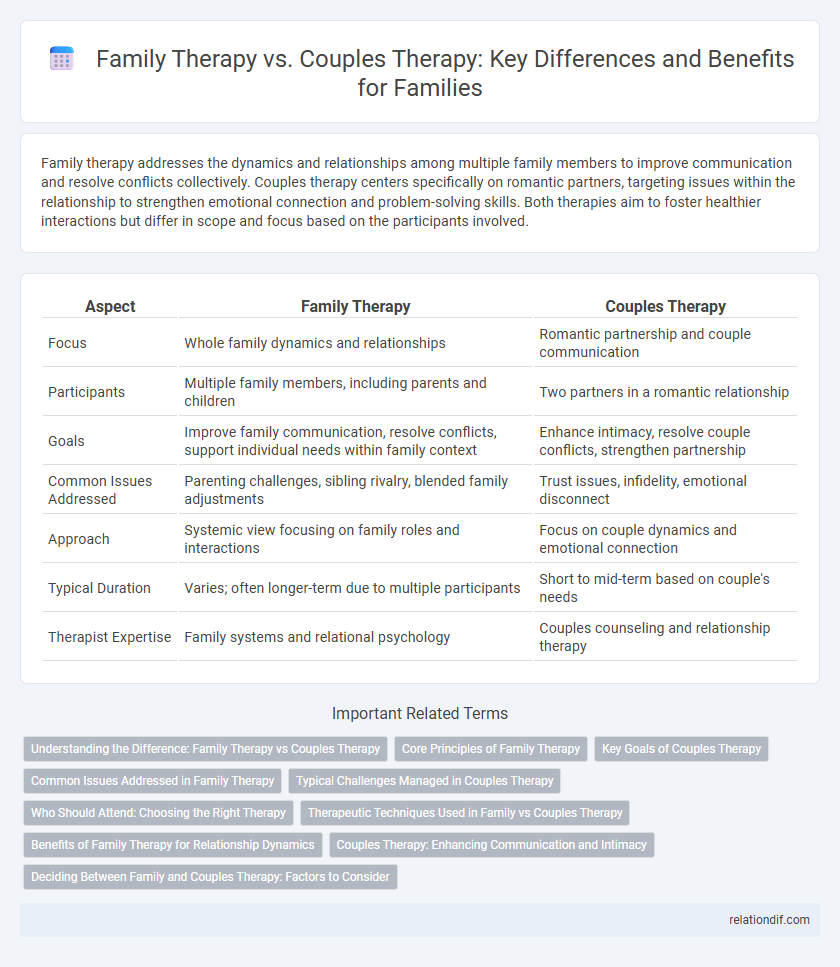Family therapy addresses the dynamics and relationships among multiple family members to improve communication and resolve conflicts collectively. Couples therapy centers specifically on romantic partners, targeting issues within the relationship to strengthen emotional connection and problem-solving skills. Both therapies aim to foster healthier interactions but differ in scope and focus based on the participants involved.
Table of Comparison
| Aspect | Family Therapy | Couples Therapy |
|---|---|---|
| Focus | Whole family dynamics and relationships | Romantic partnership and couple communication |
| Participants | Multiple family members, including parents and children | Two partners in a romantic relationship |
| Goals | Improve family communication, resolve conflicts, support individual needs within family context | Enhance intimacy, resolve couple conflicts, strengthen partnership |
| Common Issues Addressed | Parenting challenges, sibling rivalry, blended family adjustments | Trust issues, infidelity, emotional disconnect |
| Approach | Systemic view focusing on family roles and interactions | Focus on couple dynamics and emotional connection |
| Typical Duration | Varies; often longer-term due to multiple participants | Short to mid-term based on couple's needs |
| Therapist Expertise | Family systems and relational psychology | Couples counseling and relationship therapy |
Understanding the Difference: Family Therapy vs Couples Therapy
Family therapy addresses dynamics among multiple family members to improve communication, resolve conflicts, and strengthen relationships within the entire family system. Couples therapy specifically targets romantic partners, focusing on issues such as intimacy, trust, and conflict resolution to enhance the partnership. Understanding these distinctions helps individuals choose the appropriate therapeutic approach based on their relational goals and challenges.
Core Principles of Family Therapy
Family therapy centers on systemic interactions and communication patterns within the family unit, emphasizing the roles and relationships that influence individual behavior. It employs techniques such as structural, strategic, and systemic interventions to address conflicts, improve family dynamics, and promote healing. Core principles include viewing the family as an interconnected system, recognizing patterns of interaction, and fostering collaboration among members to create lasting change.
Key Goals of Couples Therapy
Couples therapy primarily aims to improve communication, resolve conflicts, and enhance intimacy between partners, fostering a healthier and more satisfying relationship. Key goals include identifying and addressing negative interaction patterns, building trust, and promoting emotional connection. Unlike family therapy, which addresses dynamics among multiple family members, couples therapy focuses specifically on the romantic partnership and its unique challenges.
Common Issues Addressed in Family Therapy
Family therapy commonly addresses issues such as communication breakdowns, parent-child conflicts, and behavioral problems in children or adolescents. It also targets family dynamics involving grief, trauma, substance abuse, and mental health disorders that impact multiple family members. By focusing on relational patterns and systemic interactions, family therapy aims to improve overall family functioning and emotional support.
Typical Challenges Managed in Couples Therapy
Couples therapy typically addresses communication breakdowns, trust issues, and conflicts surrounding intimacy and finances. Therapists work to resolve patterns of blame and foster emotional connection between partners. Key challenges often include infidelity recovery, parenting disagreements, and managing life transitions together.
Who Should Attend: Choosing the Right Therapy
Family therapy involves multiple family members and is ideal when addressing relational dynamics affecting the entire family system, such as communication issues or collective stressors. Couples therapy focuses exclusively on partners and is suitable for resolving conflicts, improving intimacy, or managing relationship transitions between two people. Selecting the appropriate therapy depends on whether the goal is to heal the family unit or strengthen the couple's bond.
Therapeutic Techniques Used in Family vs Couples Therapy
Family therapy employs systemic techniques such as genograms and structural mapping to explore interpersonal dynamics among multiple family members, while couples therapy focuses on methods like Emotionally Focused Therapy (EFT) and the Gottman Method to improve communication and emotional connection between partners. Family therapists often utilize role-playing and boundary-setting exercises to address collective issues, whereas couples therapists prioritize conflict resolution strategies and intimacy-building interventions targeted at dyadic relationships. Both approaches integrate cognitive-behavioral techniques but tailor them to either the broader family system or the intimate couple context for effective therapeutic outcomes.
Benefits of Family Therapy for Relationship Dynamics
Family therapy enhances communication and resolves conflicts by involving all family members, addressing underlying relational patterns that individual or couples therapy might overlook. It fosters empathy and understanding among relatives, promoting healthier interactions and stronger bonds within the family unit. By tackling systemic issues, family therapy supports long-term relationship stability and emotional resilience across generations.
Couples Therapy: Enhancing Communication and Intimacy
Couples therapy specifically targets improving communication patterns and deepening emotional intimacy between partners by addressing unresolved conflicts and fostering empathy. Techniques such as emotion-focused therapy and cognitive-behavioral interventions help couples develop healthier interaction styles and rebuild trust. Emphasizing mutual understanding and vulnerability, couples therapy enhances relationship satisfaction and long-term connection.
Deciding Between Family and Couples Therapy: Factors to Consider
Deciding between family therapy and couples therapy depends on the specific dynamics and issues within the family unit or relationship. Family therapy addresses communication patterns, roles, and conflicts among multiple family members, making it effective for systemic problems involving children, parents, or extended relatives. Couples therapy concentrates on the romantic partnership, focusing on improving intimacy, conflict resolution, and mutual understanding between the two partners.
family therapy vs couples therapy Infographic

 relationdif.com
relationdif.com